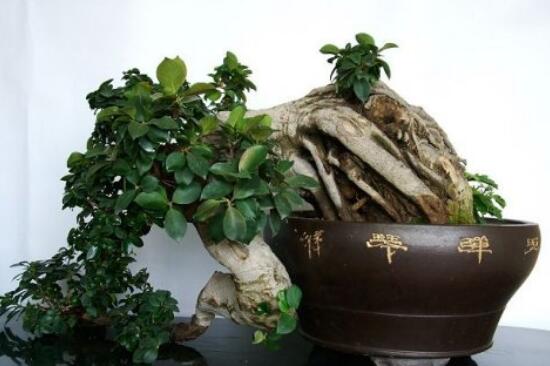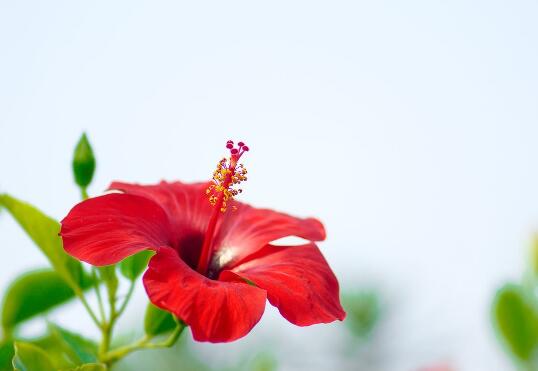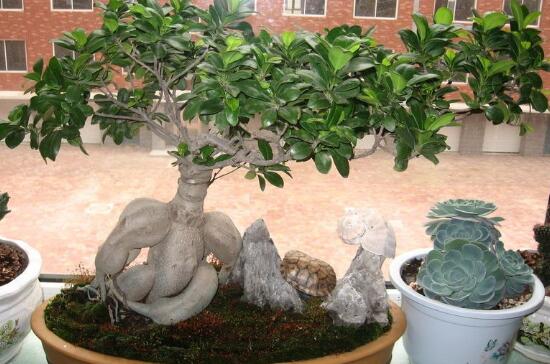What if the leaves of the banyan tree turn black? adjust the temperature / reasonable water and fertilizer / spraying with diseases and insect pests
The banyan tree, currently the most popular bonsai plant, is highly adaptable, good-looking, and can purify the air and treat diseases medicinally, so it is deeply loved by flower friends. But in the process of breeding, many flower friends will encounter the symptoms of blackening leaves, giving people a headache. So, what if the leaves of the banyan tree turn black? Today, the editor is here to solve this problem for everyone.
First, the leaves of the banyan tree are black, find the reason.

As a kind of ornamental plant, the cultivation method of banyan tree is not difficult, but because most of them are novice, they have all kinds of problems because they can't raise it, such as yellowing banyan leaves, blackening banyan leaves, losing banyan leaves and so on. Yellowing and falling leaves have been solved before, what about the black leaves of the banyan tree? In this regard, the editor summarized five causes and attached solutions, let's move on.
Second, the causes and solutions of blackening of banyan leaves.
1. Lack of light
The banyan tree likes the light, and enough light can make it grow luxuriantly. But if it is placed in a dark place indoors for a long time, its leaves will blacken because of insufficient photosynthesis.
Solution: it is very simple, move it to the indoor semi-shade, and put the right amount in the sun to bask in the sun.
2. The temperature difference is too large.
Banyan tree is sensitive to temperature, it is suitable to grow in places with small temperature difference between day and night, otherwise it is not suitable for banyan tree growth. It is understood that once the temperature difference between day and night is more than 10 ℃, banyan trees will have large areas of yellow leaves and black leaves.
Solution: in the maintenance of banyan tree, do not often move the flowerpot, and put it in a ventilated and transparent position, timely shade in summer, timely warmth in winter.
3. Overwatering
The banyan tree likes a humid environment. In its peak growing season, we should water it frequently and keep the basin soil moist. However, watering should not be too much, otherwise it will lead to stagnant water in the basin, which will not absorb oxygen and isolate the nutrient absorption of the plant. After a long time, the leaves of the plant will certainly turn black.
Solution: if the leaves of the banyan tree are black, first observe whether the roots are rotten, if not, put it in a ventilated place to allow rapid water loss; if the roots are rotten, you need to cut the rotten roots and cut them off. Then soak in disinfectant and replant it.
4. Improper fertilization
Banyan like fertilizer, the growth process needs adequate nutrients, but we must pay attention to fertilization, not too much and not too thick, otherwise it will cause harm to the growth of banyan, and then the leaves may turn black.
Solution: timely irrigation to dilute the fertilizer, and then flow out from the bottom of the basin; if the root burns, you also need to cut off the rotten root, change the pot soil, and replant. After that, fertilizing is reduced or not applied in winter, and once a month in other seasons, choose thin fertilizer and water, preferring light to thick.
5. Diseases and insect pests
In addition to the above points, there is another reason for the blackening of banyan leaves, that is, it is attacked by diseases and insect pests. In the environment of high temperature and humidity, scale insects and aphids often appear if they are not properly maintained. When the disease occurs, the leaves appear black spots and black powdery substances, causing the plant to induce soot disease.
Solution: clean the disease spot with brush and spray insecticide in time. As for what kind of medicine to spray, there is a detailed introduction in the pest control of banyan tree.
Generally speaking, the banyan tree is a highly adaptable plant. As long as you take good care of it, it will grow very good-looking. But if we are careless maintenance, for a long time, there will be the phenomenon of black leaves. With regard to the blackening of the leaves of the banyan tree, the editor has introduced it here, hoping to give you some help.
What if the banyan tree grows insects? pest control of banyan tree / 3 insects and 2 diseases are sprayed with medicine.
Banyan bonsai is certainly no stranger to everyone. It is the most common bonsai in daily life and has a very high ornamental value. Generally speaking, the banyan tree has a strong adaptability and is not prone to diseases and insect pests, but in the case of improper maintenance, it will also grow insects and get sick, so what about the banyan trees? The following are several kinds of banyan common pest control, let's go and have a look!
First, banyan trees grow bugs, spray with medicine
As a common ornamental plant, the breeding method of banyan tree is very simple, no matter how easy it is to raise a plant, it also needs to be raised by people! Once the indoor environment is too poor, coupled with negligent management, banyan trees will grow insects and get sick. As for what to do when the banyan tree grows bugs, it is actually very simple, just need everyone to find out what kind of insect pest it is, and then aim at spraying.
II. Pest control of banyan trees
1. Banyan scale insects
In the process of breeding, banyan diseases and insect pests are rare, but when the environment is not ventilated and improperly maintained, there are occasional shell insects. There are many species of scale insects, such as wax powder scale, tortoise wax scale and so on, which are often harmful to banyan trees. they are mainly parasitic on leaves and fresh branches and absorb plant nutrients.
Control method: if the leaves of banyan trees are found to be yellow, they should be checked to see if they are insect insects. If a small amount of scale insects are found, they can be washed away with water in time; if there are many scale insects, the medicine can be sprayed after manual removal, and the agent can be used to kill scale 800-1000 times, and the control effect can be achieved at one time.
2. Banyan aphids
In addition to shell insects, aphids are also one of the insects that attack banyan trees. The insect has a double thorn sucking mouth, which often gathers on the tender shoot and the back of the leaf absorbs plant juice, which makes the plant grow slowly. At the same time, a large amount of honeydew discharged by aphids can induce coal fouling disease and seriously affect photosynthesis.
Prevention and control methods: when a small number of pests are found, wipe them with clean water or soapy water with cloth to remove the insects and continue to spread; when there are many aphids, after manual cleaning, 40% omethoate 1000 times or 50% dichlorvos 1000 times solution should be sprayed for prevention and control, once every 7 seconds and 10 days, and the effect is excellent for 3 consecutive times.
3. Banyan red spider
In fact, red spider is one of the most common pests in banyan trees. Under the condition of high temperature, banyan trees are easy to give birth to red spiders if they are not properly maintained, and they often gather a large number of leaf spines to absorb juice. After being attacked by the red spider, the leaves of the plant will appear yellow spots, and in serious cases, the banyan tree will lose its leaves.
Prevention and control methods: the red spider is the most harmful from May to June every year. Spray the insecticide in time when it is found, choose 1000 times EC of phenyledalin, spray once every 10 days, and then completely eliminate it after 3-4 times.
4. Banyan brown spot
To talk about the diseases and insect pests of the banyan tree, after talking about the insect pests, let's take a look at the diseases, the most common of which is brown spot, which mainly harms the leaves of the plant and is one of the main reasons for the blackening of the leaves of the banyan tree. Symptoms: at the initial stage, the diseased leaves will appear round or oval spots, showing purplish brown and turn black in the later stage, and even the leaves will wither and yellow and fall off in serious cases.
Prevention and treatment: when the above symptoms are found, remove the diseased leaves in time and burn them centrally to reduce the source of the disease. At the initial stage of the disease, spray 70% manganese zinc wettable powder 400 times, once every 10 days, 3 times 4 times in a row, the prevention and control effect is good.
5. Banyan soot disease
In the environment of high temperature and humidity, scale insects and aphids often appear if they are not properly maintained. When the disease occurs, the leaves appear black spots and black powdery substances, causing the plant to induce soot disease.
Control method: clean the disease spot with brush and spray insecticide in time, according to the above pest control methods. In addition, in peacetime, it is necessary to strengthen maintenance, reduce air humidity and strengthen ventilation.
Generally speaking, the effect of the banyan tree is good, and it is easy to raise, so it is very suitable for keeping indoors. But once it is neglected to manage, it will be targeted by diseases and insects, thus seriously affecting its ornamental. Therefore, for the sake of the health of the banyan tree, we must raise it carefully. With regard to the prevention and control of diseases and insect pests in banyan trees, the editor has introduced this, hoping to give you some help.
How to do the yellowing of banyan leaves? six causes and solutions / improper water and fertilizer is the key.
The banyan tree, a beautiful plant, is often made into bonsai and raised at home. The beauty of the banyan tree lies in its strong roots and its leafy upper body, so when its leaves turn yellow and affect its beauty, flower friends must be in a hurry! What if the leaves of the banyan tree turn yellow? Today, the editor is here to solve this problem for everyone.
First, the leaves of the banyan tree turn yellow, look for the cause
As a common ornamental plant, the cultivation method of banyan tree is not difficult, but because there are many newcomers, and because many people raise them roughly, the leaves will usually turn yellow. They would like to know what to do if the banyan leaves turn yellow. In this regard, the editor will analyze for you one by one from the five aspects of environment, light, watering, fertilization and insect pests, and tell you how to solve it.
Second, the causes and solutions of the yellowing of banyan leaves.
1. Environmental mutation
Generally speaking, there are many reasons for the yellowing of banyan leaves, but the first thing we should consider is the environment. The new potted plants bought online, because of the large geographical cross-service, and the banyan tree may not be able to adapt to the change of growth environment and its leaves are yellow.
Solution: if it is a newly bought banyan potted plant, the appearance of yellow leaves is actually very normal, we only need to meet its growth habits, careful maintenance for a period of time will recover.
2. Improper lighting
Lack of light: banyan tree likes light, sufficient light can make it grow luxuriant branches and leaves, more ornamental. But if the banyan tree is placed in the dark for a long time, its leaves will turn yellow because of insufficient photosynthesis. Solution: move the banyan tree to a semi-shaded place for maintenance, and let it out to bask in the sun from time to time, of course, when the sun is not too strong.
The light is too strong: although the growth of the banyan tree needs sufficient light, it avoids strong light. Once it is exposed to the sun in summer, its leaves will be burned and yellow. Solution: timely move the banyan tree to the indoor semi-shade for maintenance, after a period of time, appropriate watering, and then careful maintenance for a few days, it will recover.
3. Improper watering
Insufficient watering: when it comes to yellowing of banyan leaves, it is generally due to excessive drought. The banyan tree likes a humid environment. If it is not watered for a long time, or if it has not been watered thoroughly for a long time, its leaves will turn yellow because of lack of water. Solution: pour a small amount of water in time, and spray water on the leaves, so that the leaves replenish water as soon as possible.
Too much watering: although the banyan tree likes the wet environment, but this "wet" also has a degree, once excessive, leading to stagnant water in the basin, the banyan root will rot due to lack of oxygen and poor ventilation, resulting in yellowing leaves. Solution: dry the basin soil in time, or change it directly.
4. Insufficient fertilization
The banyan tree likes fertilizer and needs sufficient nutrients in the process of growth. if the fertilization is insufficient, the plant will not get enough nutrients, which will also cause the branches and leaves to be thin and yellow.
Solution: appropriately increase the amount of fertilizer, in order to meet the growth of banyan trees, flower friends should apply rotten fertilizer and water once a month in summer and autumn, with little or no fertilization in winter. Let the banyan tree have sufficient nutrition, the leaves will recover quickly.
5. Soil alkalinity.
Banyan likes slightly acidic soil, if improper fertilization, especially excessive application of nitrogen fertilizer, resulting in alkaline soil, it will easily cause banyan leaves yellowing.
Solution: stop watering, and then more watering, let the fertilizer out of the soil as soon as possible, or trouble, directly change the pot soil, let the plant refresh again.
6. Insect pests
When the temperature is high and the room is not ventilated, the banyan tree which is not susceptible to insects will also be attacked by insects, thus causing the leaves to turn yellow.
Solution: at this time, we must find pests in time, and through artificial insecticidal, drug insecticidal to control as soon as possible. As for what kind of medicine should be sprayed, there is a detailed introduction in the prevention and control of diseases and insect pests in the banyan tree.
Generally speaking, the banyan tree is still very easy to raise, but if you want its leaves to be green and not yellow, you must pay attention to the light, water and fertilizer. Of course, don't worry when you find yellow leaves, just solve it according to the above method. With regard to the yellowing of the leaves of the banyan tree, the editor has introduced it here, hoping to give you some help.
- Prev

How to raise hibiscus flowers, cultivation methods and precautions of hibiscus flowers/sufficient light
Hibiscus is also known as hibiscus flower, is a flower plant of Malvaceae, has a high ornamental, in many areas of our country are cultivated. However, if you want to raise it well, there are many places to pay attention to. How to raise hibiscus? What are the cultivation methods and precautions of hibiscus
- Next

How to water banyan bonsai, banyan watering the correct way/summer morning and evening need watering
Banyan bonsai, flower friends should not be unfamiliar, it has many shapes, overall beauty, and home collocation, has an excellent viewing effect. However, if you want the efficacy of banyan trees to be reflected, you must be careful in the breeding process, especially watering, not sloppy! So how do you water banyan trees?
Related
- Fuxing push coffee new agricultural production and marketing class: lack of small-scale processing plants
- Jujube rice field leisure farm deep ploughing Yilan for five years to create a space for organic food and play
- Nongyu Farm-A trial of organic papaya for brave women with advanced technology
- Four points for attention in the prevention and control of diseases and insect pests of edible fungi
- How to add nutrient solution to Edible Fungi
- Is there any good way to control edible fungus mites?
- Open Inoculation Technology of Edible Fungi
- Is there any clever way to use fertilizer for edible fungus in winter?
- What agents are used to kill the pathogens of edible fungi in the mushroom shed?
- Rapid drying of Edible Fungi

